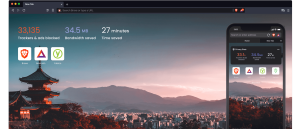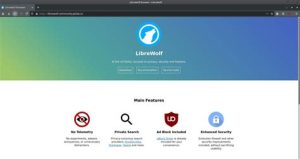‘Don’t put all your eggs in one basket’. A wise saying and it applies well to Digital Privacy. Using one Browser to surf the web makes it easy for data broking services to track you across every website you visit. If we put all our personal information in one place (the internet) by using it everywhere we interact online, then we risk losing all that information in one incident (data breach, identity theft, credit card fraud etc.). What’s more, we risk having it stolen by hackers, or sold by the service operator itself. In our digital lives, ‘Don’t put all your eggs in one basket’ is really talking about compartmentalisation—categorizing and separating our private data into many different compartments to reduce the impact when it is compromised.
A great first step to compartmentalisation is to use more than one browser when surfing the web. This will help mitigate data brokers and corporations who view you as a commodity from tracking your whole Internet life. With browser compartmentalisation (also known as browser Isolation), you can use different browsers for different activities.
Not all browsers are focused on protecting your digital privacy, so it is important to choose those browsers who have a great reputation for digital privacy. For example, Google Chrome browser would not be a privacy focused browser as Google is the king of data harvesting and commoditising its users. The same goes for Microsoft Edge and Apple Safari browsers.
Privacy Focused Browsers
Listed below are my recommendations for privacy focused browsers to use for browser compartmentalisation.
Brave
Brave features: Chromium-based | Blocks third-party ad trackers | Blocks cookies | Incognito windows | Onion routing. Brave is a Chromium-based browser that blocks ads, fingerprinting, and ad trackers by default.
Brave supports millions of users worldwide. The organization’s business model relies on privacy-protecting ads that pay publishers and users when users pay attention to ads. The company is transparent about this revenue stream, and it is optional — with users rewarded in crypto tokens if they opt into ad viewing.
Brave has several privacy-enhancing settings, including options to block third-party ad trackers, upgrade unsecured connections to HTTPS, as well as block cookies and fingerprinting. Invasive ads and trackers are disabled, which the company says then improves loading times on desktop and mobile.
Brave removed Google code from its Chromium to improve user privacy, including some account integration, background sync, and inline extensions. There is also a “Tor mode” available for use, which provides anonymized onion network routing.
The browser developer also offers a VPN and firewall service which protects sessions even outside of the browser. Brave is now shipping a new feature called Unlinkable Bouncing. According to the developer, when you’re about to visit a privacy-harming or suspicious website, your session is routed through temporary browser storage to prevent the site from identifying you instead, you will appear as a unique, first-time visitor, which helps to anonymize your visit.
Brave is also due to start rolling out a feature called “Off the Record,” (OTR), developed with users who may be the victims of intimate partner violence. The browser developer says the feature “aims to help people who need to hide their browsing behaviour from others who have access to their computer or phone”.

Firefox
Mozilla Firefox features: Enhanced tracking protection | Firefox Focus for mobile | Strict privacy standards | DNS queries sent to a secure resolver service | Focus on accessibility. Firefox is a must-have for individual browser privacy across multiple devices.
One of Firefox’s most important privacy features is enhanced tracking protection. Mozilla has also borrowed Tor techniques to block browser fingerprinting, and Firefox developers are constantly seeking to improve tracking-prevention features.
Firefox is rich with choices to customize the browser for privacy The standard enhanced tracking prevention blocks social media trackers, cross-site tracking cookies, and blocks tracking in private windows, crypto miners, and fingerprinting scripts. There is a “strict” mode, too, that might break some sites when trackers are hidden in content — but there are ways to allow enhanced tracking protection for trusted sites.

DuckDuck Go
When it comes to DuckDuckGo, user privacy comes first. The privacy-focused search engine is a vocal supporter of consumer privacy rights and now handles millions of user search queries daily.
DuckDuckGo and the rise of the encrypted messaging app Signal show there is a growing appetite for privacy-focused alternatives to tech giants like Facebook and Google. DuckDuckGo’s Privacy Essentials extension for Chrome, Firefox, and Microsoft’s Edge has also proven popular. Its reputation is built on the idea that it does not collect user data but can provide the same search results as those that do.
DuckDuckGo is a search engine rather than a full browser, but the software is still recommended as an extension or as a mobile solution. The organization’s mobile app provides a private search, website protection and blockers, web encryption, and more.

Mullvad Browser
Mullvad is a new entry to the secure browser market. Not to be confused with the Tor browser, the Mullvad Browser is marketed as the “Tor Browser without the Tor network.” The browser is built by the Tor Project team and distributed by Mullvad, a well-respected Swedish virtual private network provider.
The idea behind the browser is to emulate the Tor network by creating a similar fingerprint for all users, improving anonymity. Furthermore, the browser comes with a private mode out of the box, tracking and cookies are blocked, and online functions used to extract information from visitors — such as device identifiers — are prevented. You can use the browser as a standalone product, or you can combine it with Mullvad VPN.

Libre Wolf
This project is a custom and independent version of Firefox, with the primary goals of privacy, security and user freedom.
LibreWolf is designed to increase protection against tracking and fingerprinting techniques, while also including a few security improvements. This is achieved through our privacy and security-oriented settings and patches. LibreWolf also aims to remove all the telemetry, data collection and annoyances, as well as disabling anti-freedom features like DRM.

How Many Browsers Do I Need?
This will depend how many online accounts you must protect. I would recommend using one browser to access your email, one browser to access your online bank account/s and one browser to surf the web (but not logging into accounts). If you have other sites you log into, you will use more browsers.
Case Study
Ahmed used Brave browser for general surfing of the web. Mullvad browser for accessing his online bank account. LibreWolf for accessing his email account and Firefox for accessing X (formerly known as Twitter). DuckDuckGo browser for online shopping sites. This gives Ahmed a greater level of digital privacy and security as by using separate browsers this restricts companies from tracking Ahmed between sites. If one of his browsers get compromised, then all Ahmed’s other accounts are still protected.
As I have said previously the number of browsers will depend on how many accounts you wish to protect. Browser compartmentalisation is an easy way to protect your security and privacy.

No responses yet